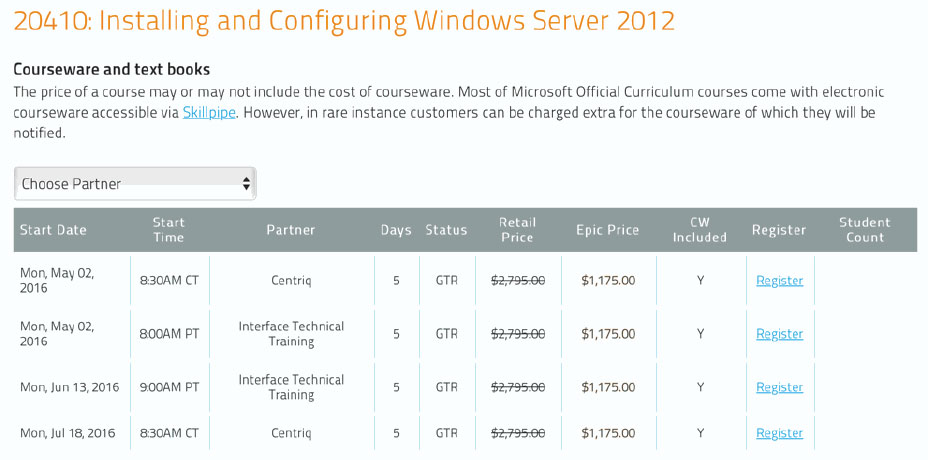PROJ+: CompTIA Projects +
About this Course
If you are taking this course, you probably have some professional exposure to the duties of a project manager, or you may be embarking on a career in professional project management. As a project manager, the ability to demonstrate best practices in project management—both on the job and through professional certification—is becoming the standard to compete in today’s fast-paced and highly technical workplace. In this course, you will apply the generally recognized practices of project management to successfully manage projects.
Project managers are always under severe pressure to complete projects on time and within budget. However, most projects fail to meet these demands and as a result, many projects are terminated early. Successful project management requires knowledge and experience. This course is designed to provide you with the skills needed to be a successful project manager in today’s rapidly changing world. Additionally, this course can be a significant part of your preparation for the CompTIA® Project+® certification exam. The skills and knowledge you gain in this course will help you avoid making costly mistakes and increase your competitive edge in the project management profession.
Audience Profile
This course is designed for individuals in various job roles who have a basic knowledge of project management, and who participate in small to medium scale projects.
This course is also designed for students who are seeking the CompTIA® Project+® certification and who want to prepare for the CompTIA® Project+® PK0-004 Certification Exam. A typical student taking the CompTIA® Project+® PK0-004 Certification Exam should have a minimum of 12 months of project management experience. Experience with specific project management software is helpful, but not mandatory.
At Course Completion
Outline
Lesson 1: Defining Project Management Fundamentals
Topic A: Identify Project Management Basics
Topic B: Describe the Project Life Cycle
Topic C: Identify Organizational Influences on Project Management
Topic D: Define Agile Methodology
Lesson 2: Initiating the Project
Topic A: Identify the Project Selection Process
Topic B: Prepare a Project SOW
Topic C: Create a Project Charter
Topic D: Identify Project Stakeholders
Lesson 3: Planning the Project
Topic A: Identify Project Management Plan Components
Topic B: Determine Stakeholder Needs
Topic C: Create a Scope Statement
Lesson 4: Preparing to Develop the Project Schedule
Topic A: Develop a WBS
Topic B: Create an Activity List
Topic C: Identify the Relationships Between Activities
Topic D: Identify Resources
Topic E: Estimate Time
Lesson 5: Developing the Project Schedule
Topic A: Develop a Project Schedule
Topic B: Identify the Critical Path
Topic C: Optimize the Project Schedule
Topic D: Create a Schedule Baseline
Lesson 6: Planning Project Costs
Topic A: Estimate Project Costs
Topic B: Estimate the Cost Baseline
Topic C: Reconcile Funding and Costs
Lesson 7: Planning Human Resources and Quality Management
Topic A: Create a Human Resource Plan
Topic B: Create a Quality Management Plan
Lesson 8: Communicating During the Project
Topic A: Identify Communication Methods
Topic B: Create a Communications Management Plan
Lesson 9: Planning for Risk
Topic A: Create a Risk Management Plan
Topic B: Identify Project Risks and Triggers
Topic C: Perform Qualitative Risk Analysis
Topic D: Perform Quantitative Risk Analysis
Topic E: Develop a Risk Response Plan
Lesson 10: Planning Project Procurements
Topic A: Collect Project Procurement Inputs
Topic B: Prepare a Procurement Management Plan
Topic C: Prepare Procurement Documents
Lesson 11: Planning for Change and Transitions
Topic A: Develop an Integrated Change Control System
Topic B: Develop a Transition Plan
Lesson 12: Executing the Project
Topic A: Direct the Project Execution
Topic B: Execute a Quality Assurance Plan
Topic C: Assemble the Project Team
Topic D: Develop the Project Team
Topic E: Manage the Project Team
Topic F: Distribute Project Information
Topic G: Manage Stakeholder Relationships and Expectations
Lesson 13: Executing the Procurement Plan
Topic A: Obtain Responses from Vendors
Topic B: Select Project Vendors
Lesson 14: Monitoring and Controlling Project Performance
Topic A: Monitor and Control Project Work
Topic B: Manage Project Changes
Topic C: Report Project Performance
Lesson 15: Monitoring and Controlling Project Constraints
Topic A: Control the Project Scope
Topic B: Control the Project Schedule
Topic C: Control Project Costs
Topic D: Manage Project Quality
Lesson 16: Monitoring and Controlling Project Risks
Topic A: Monitor and Control Project Risks
Lesson 17: Monitoring and Controlling Procurements
Topic A: Monitor and Control Vendors and Procurements
Topic B: Handling Legal Issues
Lesson 18: Closing the Project
Topic A: Deliver the Final Product
Topic B: Close Project Procurements
Topic C: Close a Project
Prerequisites
To ensure your success, you should be familiar with basic project management concepts. To meet this prerequisite, you can take any one or more of the following courses:
- Project Management Fundamentals (Third Edition), or equivalent knowledge
Basic computing skills and some experience using Microsoft Office are desirable but not required. You can obtain this level of skills and knowledge by taking one or more courses in Microsoft Office curriculum; for example:
- Microsoft® Office Word 2016: Part 1
- Microsoft® Office Excel® 2016: Part 1

